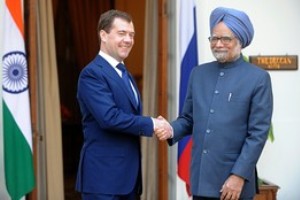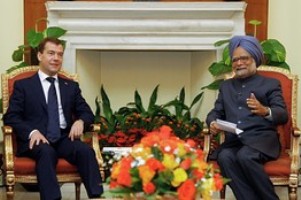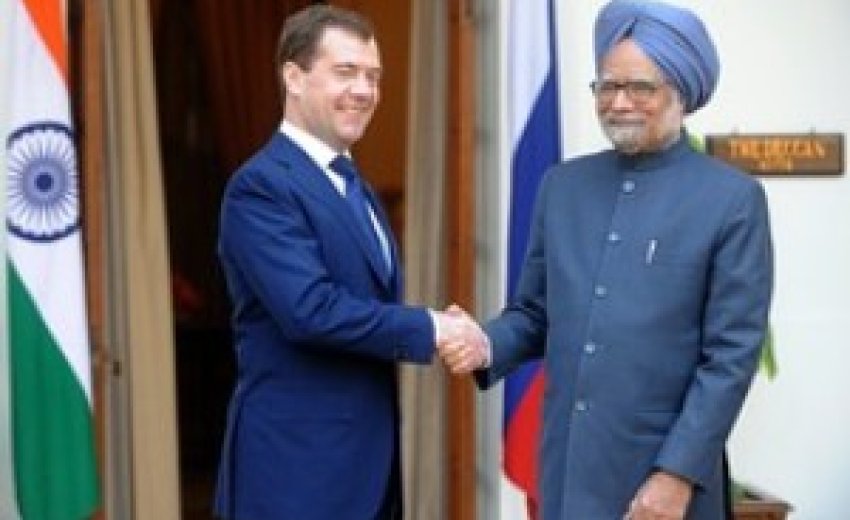NEW DELHI—India and Russia on Tuesday signed a number of economic and defense agreements, as Moscow moved to shore up its relationship with New Delhi, an old ally that also has been courted in recent months by the U.S., U.K., France and China.
President Dmitry Medvedev arrived in India for two days of talks, making him the fifth and final leader from a nation with a permanent seat on the United Nations Security Council to visit the South Asian country in 2010. Russian Presidents in India
 |
| AFP/Getty Images |
| Russia's President Dmitry Medvedev ishook hands with India's Prime Minister Manmohan Singh during a meeting in New Delhi. |
Moscow is eager to boost its trade with India—the world's No. 2 fastest-growing major economy after China—especially through expanded exports of defense and nuclear equipment. Russia's two-way trade with India totaled $4.6 billion in the year to March 31, a decline of 16% from the previous year and only a tenth of China's bilateral trade with India.
In return, New Delhi wants better access to Russia's oil and gas industry, and support for its bid for a permanent seat on the U.N. Security Council. The latter effort could take years and faces uncertain prospects, but India's pursuit of permanent membership underscores its global ambitions.
Mr. Medvedev on Tuesday offered an endorsement of India's U.N. ambitions. "Russia considers India a strong and deserving candidate to have a permanent seat on the United Nations Security Council," he said in a joint news conference with Indian Prime Minister Manmohan Singh.
U.S. President Barack Obama also backed India for a permanent seat during his trip to India in November. China's Premier Wen Jiabao, in India last week, said only that Beijing understands India's desire to play a bigger role at the U.N., including on the Security Council.One of the agreements signed Tuesday is for India and Russia to jointly design and develop a fifth-generation fighter aircraft, which could be ready for production by 2020 and is valued at tens of billions of dollars in contracts.
India's state-run Hindustan Aeronautics Ltd., and Russia's Sukhoi Design Bureau Co. and Rosoboronexport State Corp. will jointly work on the designs over two years.
Russia has been emphasizing its long-term role in co-developing military equipment with India—rather than just selling arms to New Delhi—to bolster its chances of winning immediate sales contracts.
India has doubled spending on its military over the past six years, to $32 billion this year. Next year, New Delhi will decide the winner of an $11 billion tender to supply 126 fourth-generation fighter jets to the Indian Air Force, one of its largest-ever military supply contracts.
Russia is hoping India will chose the MiG-35, but it has to compete with jets made by Boeing Co. and Lockheed Martin Corp., of the U.S., France's Dassault Aviation, and a consortium of European companies. Medvedev in India
 |
| AP Photo/RIA Novosti, Dmitry Astakhov, Presidential Press Service |
| Mr. Medvedev, left, with Mr. Singh before delegation level talks in New Delhi. |
A series of other commercial agreements were signed on the sidelines of the meeting, including one for Russia's OAO Severstal to build a steel plant in Karnataka state in a joint venture with India's state-owned National Mineral Development Corp., a deal first reported earlier this month.
Mr. Singh said he discussed with Mr. Medvedev the possibility of Russia expanding the capacity of two nuclear-power plants that Moscow is constructing in Tamil Nadu state that are set to begin operations next year.
India is a net energy importer and has been developing its civilian nuclear industry after the Nuclear Suppliers Group—an organization that seeks to stem the proliferation of nuclear weapons by restricting trade in material that could be used to make arms—agreed to lift restrictions on the export of nuclear fuel and equipment to New Delhi.
India also is pushing to develop energy assets overseas and sees Russia as a key partner.
Another agreement signed Tuesday allows for the overseas arm of India's state-owned Oil & Natural Gas Co. to consider taking a stake in assets owned by Russia's AFK Sistema, and vice versa.
ONGC has for years tried to develop assets in Russia and has a 20% stake in a consortium led by Exxon Mobil Corp. that is developing the Sakhalin-1 oil and gas field. In 2009, ONGC bought Imperial Energy, a Russian company, for $2.4 billion. But it has faced obstacles, including Russia's decision in September to disqualify a subsidiary of ONGC, along with a number of other foreign oil companies, from bidding for the massive Trebs and Titov oil and gas deposits in northwest Russia.
This month, Moscow named JSC Bashneft, owned by Sistema, as the winner of the Trebs and Titov auction.
Mr. Medvedev appeared keen to change a perception in India that it hasn't been able to break into Russia's energy industry in a significant way.
"India for us is a comfortable partner in terms of energy," Mr. Medvedev said. The ONGC partnership with Sistema "can serve as an example of fruitful cooperation between us in this domain."
A Sistema spokeswoman said the pact signed Tuesday didn't specify what agreements the companies might work on together. She declined to say whether the two companies were discussing Trebs and Titov.
Other framework agreements involving Russian energy companies in the past often have come to nothing, analysts said. —Nadia Popova in Moscow contributed to this article.
Write to Tom Wright at [email protected]
